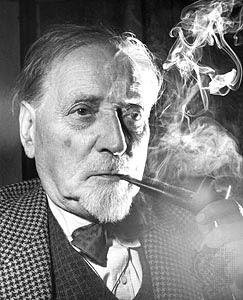Great Smokers in History

“The harder I work the more I need to smoke because tobacco is the handmaid of literature.” – Sir Compton Mackenzie (1883-1972). Author of nearly 100 books, Mackenzie by his own estimate smoked half a ton of tobacco by the time he was 74, starting with his first cigarette at age four. He once described tobacco as “one of the greatest boons ever conferred upon humanity.”

Has there ever been a great writer who wasn't also a smoker? Darwin said that he quit smoking once for a month, and he never felt so stupid in his life.
ReplyDeleteDarwin should have quit for good. Freud too, smoked until his mouth rotted, and made up some ugly stuff along the way. I think Marx must have smoked right in the New York Public Library. Three of the greatest, most influential, and deluded minds of modern times. But I agree, smoking is essentially a boon to the imagination, for it virtually stops time, and Carter is a brave soul to be, apparently, its last public defender.
ReplyDeleteDennis: Homer.
ReplyDeleteLloyd: Just think of how much worse Freud and Marx would have been if they hadn't smoked.
Dennis: I'm not certain about the smoking habits of every single author I admire, so there may be a few, but it is true nearly all of them smoked.
Mackenzie is an amazing chap, isn't he? Talk about stout genes.
How were people in the past able to get so much done? They all slept more at night and took naps, they had ten children to distract them, travelling took longer, no labor saving conveinces, they would take longer lunches and get drunk at them, but still were able to write a book and review other peoples books and write political tracts and belong to five clubs. I sometimes think that time used to be slower.
Yes, amazing, Evelyn Waugh used to get drunk at *breakfast*, and then spent the rest of his day writing novels and psychologically abusing his children, then writing an article for the Evening Standard or something.
ReplyDeleteHow were people in the past able to get so much done?
ReplyDeleteEasy ... no television, no computer. And, as you point out, everything took longer, so expectations were lower.
Today, not only do most of us "waste" - from a 19th century perspective - hours watching TV and surfing the internet (and playing video games, if that's your thing), but we are constantly confronted with allegedly urgent issues that we are expected to solve immediately, just because we can.
150 years ago, communication and travel delays provided a kind of enforced idle time during which inventive minds could be quite productive. (Mind you, to the men of the 19th century and early 20th century, travel and communication seemed lightning-quick compared to all history before that. They were right, too. Perhaps things reached a kind of perfect balance: Trains and the telegraph provided just enough speed to encourage productivity without the pseudo-urgency that we have today.)
Interesting comments, Steve. You might be right. But a lot of us don't watch that much TV, and our time spent on the internet can be compared to 19th century people reading mail and various magazines.
ReplyDelete"150 years ago, communication and travel delays provided a kind of enforced idle time during which inventive minds could be quite productive"
I think you are on to something there. I also think that instead of blaming it on major distractions it's the literally thousands of minor mental distractions that act like sand in the brain gears (the amount of songs in our heads alone).
Or maybe time really was slower.
Also, in the past, people like the former homosexualist Evelyn Waugh employed servants to perform drudge tasks for them. Such a time saving device that he was able to get much more writing done than if he had be forced to scrape his own underpants clean. (I apologize in advance for that truly grotesque image).
ReplyDeleteThat was amusing, though I hope no read it right after eating Thanksgiving dinner.
ReplyDeleteI figured someone would be bring up servants. It's true they saved time for people in the past, but much of the time they saved was doing tasks which no one today needs. Lighting fires, shovelling coal, boiling water, etc. You don't need servants today to avoid these tasks.
And much of what servants did saved labor, but didn't save any actual time. See Exhibit A.
Exhibit A:
Man of the past feels hungry. Rings bell for his butler Jarvis. Waits. Jarvis arrives "Jarvis, could you get me some canapés?" Jarvis goes to kitchen. Kitchen staff prepares canapés. Jarvis returns.
Elapsed time: 14 minutes 23 seconds.
Man of today feels hungry. Get's off couch and goes to cupboard. Opens cupboard. Removes and opens bag of Funyons. Dumps Funyons into maw.
Elapsed time: 1 minute 12 seconds.